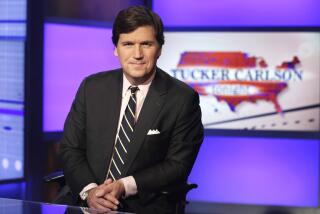Disgraced Soviet Official Denounces Ligachev in Rare Airing of Conflict
MOSCOW — Boris N. Yeltsin, who was dismissed from the top Kremlin leadership last year after making a controversial speech criticizing his more conservative colleagues, said Monday that ideology chief Yegor K. Ligachev is “slowing down” the pace of reform and should be fired.
Yeltsin, the former Moscow party chief who is now deputy head of a construction ministry, met separately with correspondents from CBS and the British Broadcasting Corp. and both times attacked Ligachev, the No. 2 figure in the Soviet hierarchy. His comments amounted to an almost unprecedented airing of differences among senior Soviet officials.
Yeltsin “absolutely” denied reports that he had spoken out against Raisa Gorbachev, the wife of Kremlin leader Mikhail S. Gorbachev, in his speech to a Communist Party Central Committee plenum last October. He did, however, say that he had criticized Ligachev directly in the speech.
‘Say It Straight’
“I have to say it straight,” Yeltsin said to the BBC. Ligachev “is one of the opponents of issues of change in social justice.”
Asked by CBS about Ligachev, Yeltsin paused dramatically, took a deep breath, and then said: “In his words and speeches, you can’t find any opposition (to Gorbachev), but we all know (Ligachev’s) style of work--not to be working actively for reform. His style is the Stalinist command economy.”
Yeltsin said that without Ligachev, the Communist Party would have made more progress on economic reforms “and we would have had more democratization.”
The BBC interviewer asked Yeltsin whether he thought Ligachev could remain in the Politburo if reforms were to succeed. Yeltsin replied, “It is up to the Central Committee. But, of course, it would be possible to develop the process more actively with someone else in that post.”
Pressed on whether he believes that Ligachev should be removed, Yeltsin replied, “Yes.”
The interviews were an extraordinary event in the evolution of contemporary Soviet political discourse. Politicians in the Soviet Union rarely, if ever, speak publicly about their differences. Discussing such subjects with Western correspondents is unheard of.
Yeltsin, who had been a chief proponent of Gorbachev’s reforms and was once Gorbachev’s lightning rod in the Politburo, almost certainly had permission from the Kremlin leader to meet formally with CBS and the BBC.
In an interview with the Washington Post and Newsweek on May 18, Gorbachev denied that there were serious rifts between himself and Ligachev. But that interview was for domestic, as well as foreign, consumption, and the Communist Party newspaper Pravda, in its published version of the interview, removed Ligachev’s name from one of the questions.
There were no reports of the CBS and BBC interviews with Yeltsin on the Soviet television news Monday night.
In the wake of speculation that Ligachev was in danger of losing his post in the Politburo after endorsing a pro-Stalinist article in the newspaper Sovietskaya Rossiya in March, Gorbachev has tried to put on a show of unity lately by having Ligachev make several high-profile appearances.
Gorbachev was reportedly infuriated by the Sovietskaya Rossiya article and commissioned a pro-reform manifesto published in Pravda as an answer.
Yeltsin said Monday that Gorbachev’s opposition could not win and consisted only of individuals “who quietly work to sabotage perestroika, “ Gorbachev’s name for social and economic reconstruction.
After his speech last October, Yeltsin was stripped of his positions in both the party Politburo and the Supreme Soviet, the legislature.
Gorbachev reportedly has great affection for Yeltsin, but joined in the denunciations of Yeltsin that were published in the Soviet press after his speech. Despite demands by some Soviet writers and commentators that the speech be printed, its complete contents remain a source of speculation.
Although CBS News’ Dan Rather said Yeltsin appeared “buoyant” and seemed “extremely confident,” Yeltsin said he was disappointed that Gorbachev did not come to his defense after the speech.
“I am upset,” he told the BBC. Gorbachev, he said, “feels this. I told him I am not satisfied in my present work” as first deputy minister for construction. “To criticize the leadership at that time--that was my mistake.”
More to Read
Sign up for Essential California
The most important California stories and recommendations in your inbox every morning.
You may occasionally receive promotional content from the Los Angeles Times.









